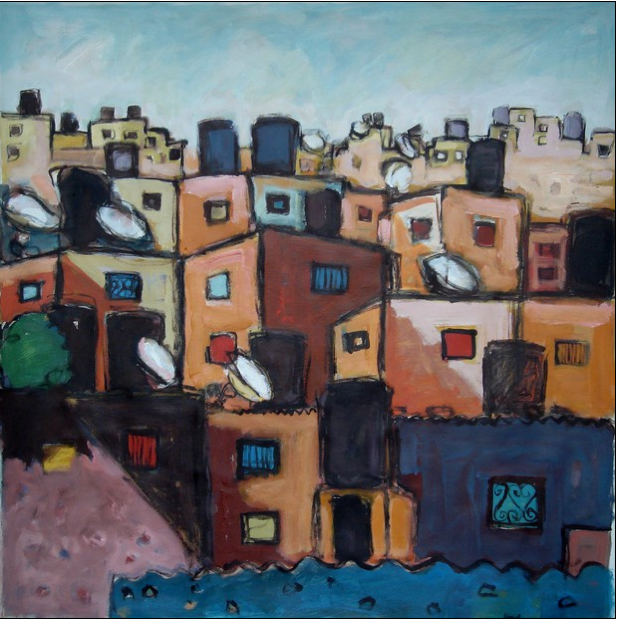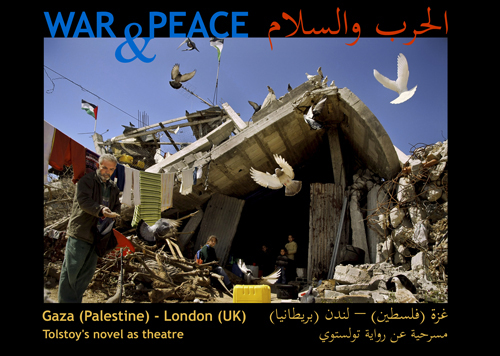HOSSAM MADHOUN’S MESSAGES ABOUT HIS EXPERIENCES DURING THE ISRAELI ATTACK ON GAZA IN 2014
For Messages from Gaza during the 2014 war, from the beginning.
I’ve just spoken via skype to Hossam Madhoun and Jamal Al Rozzi, Directors of Theatre for Everybody in Gaza with whom we at Az Theatre are developing a project called War and Peace: Gaza (Palestine)/London (UK).
They told me there was no blood being shed and no bullets flying around (for the time being) compared to the time of the recent war (the bombardment started in June and a ‘peace’ was concluded on 26 August 2014) but the pain of Gaza continues.
During the war there was a level of hope that things could not return to the way things were before, that all the suffering, damage and sacrifice would lead to a lifting of the blockade and some amelioration of life for the inhabitants of Gaza. Unfortunately things in all respects are worse than they were before. The people of Gaza have gained absolutely nothing through all their suffering. But the world’s attention has turned away from Gaza and now the dreadful consequences of the war are still being suffered by the people there. Moreover, the blockade that was condemned by the majority of the international community and by the United Nation today is legitimatized by the UN through the so-called Robert Serry plan for goods to enter Gaza. It is scheme similar to “oil for food” which was imposed on Iraq and there it made people hungrier and more vulnerable. And what makes matters even worse is that nobody is listening anymore, there are no protests.
Hossam and Jamal told me that people are turning in on themselves and that the feeling on the streets is one of distance and sourness. They also said people were aggressive to each other. Stories are rife of people trying to leave, some through the remaining tunnels, some by boat. Many have died in the attempt – many have drowned. None of this has been reported. We talked about how the world wanted to believe that the resilience of the Palestinian people would go on forever, indomitable. But we had to admit that Palestinians are not heroes, they are human beings and anyway, as Brecht said, ‘Unhappy is the land that needs heroes’.
Many people are internally shattered and exhausted and this means that relationships between people have deteriorated. Of course at times of intense danger and stress, people will tend to stick closer together but then, at certain points, they will disintegrate. There is a kind of centrifugal force that makes people want to flee and this force can become current in a whole population. To some extent the successive wars suffered by the people of Gaza will have exercised and attenuated this ‘coming together’ during violence and this ‘coming apart’ during the so-called peace that follows. I remember Hossam saying that maybe people could bear a war every ten years but 2008, 2012 and now 2014 have left people punch-drunk.
At one point there was a dreadful silence as we reflected on the fact that it was this existential destruction of people that the Israelis were aiming at. Is it possible that they were succeeding? Of course, being realistic, it was possible to admit that they could. I recognised this balance moment in the life of a people as being intrinsic to a genocidal process.
Yes, we had to admit that the intention of the Israelis was genocide. They wanted to ‘disappear’ the Palestinian people. And they might be successful.
The silence continued. We stared into a kind of abyss.
Of course historically each genocidal process was different.
I have been led to reflect on this process because of my involvement in a partnership between theatre-makers in Armenia and Turkey. I have recently returned from Yerevan where we accomplished the initial stages of this partnership project. Genocide is a process in which the different functions have to be broken down, they have to be compartmentalised. The Armenian population of Anatolia was subjected, first of all, to deportation from their homes. This was carried out by the gendarmerie in the different local districts. These local forces typically accompanied the Armenians to the borders of the local authority region. The deported were then handed over to other forces, armed gangs organised by the Committee for Union and Progress, sometimes these people were criminals specially released from prison. This is how the slaughter and further displacement was carried out. Now the Turkish state is ready to admit that there were deportations but will not admit to the full charge of genocide. They are enabled to do so by this compartmentalisation. Different functions carried out by different people. Nobody appears overall responsible. This also has to do with the robbery and theft of wealth, land and property that accompanies all genocides, including the Israeli one. Of course there is also enslavement, rape and other forms of subjection. But how the genocidal project is unfolded is different in all instances. The Israelis’ genocide is slow, attritional.
Why is it that the nation-formation process seems to feature this extreme exclusion process? How is the force and thoroughness of the genocidal expulsion linked to the gaining of an internal coherence for the developing nation state? Maybe there is in me a refusal to understand, a resistance to the implications of accepting the attendant truths about human capability. Just as in the birth of the modern Turkish state, thus in the reinvention, through National Socialism, of the German state, thus in the carving out of the Israeli state and so also in the state-building project of the Islamic State of Iraq, Syria and the Levant.
These are complex processes. There is no unitary cause. The movement of genocide is conjunctural. There are economic causes ie theft and enslavement; there are psychosocial causes ie national cohesion. It is as if nobody is singularly responsible. Everybody in the perpetrator society plays a part although sometimes passive. Often the killing is constructed as work. This was true in Rwanda where the morning radio exhorted the population during the genocide to go to work, killing. Always there is the characterisation of the victim population as being sub-human, like animals and thus the genocidal project is projected as a ‘humanisation’ process. Sometimes there is direct automated killing, sometimes death is left to do its work ‘naturally’.
All of these thoughts flooded into my mind in the silence that happened between Jamal, Hossam and I during our conversation. The silence was like a dread.
We had to make affirmations that our work together, the latest phase of which is a production of a stage version of Tolstoy’s War and Peace, was to do with resistance. Jamal told us about a thinker who asserted that resistance very often had to be played out through a smile or an act of kindness. We decided that we must work together face to face. I promised that I would visit Gaza soon. We started planning this for the end of January. They said that by that time they would have held the initial workshops on War and Peace. All the actors which might take part were still working flat out in the social regeneration programmes so urgently needed after the war. Suddenly we were talking about how we might find a summer course in the UK for their daughters who are both 13 years old. (Does anyone have suggestions?) We arranged a guitar exchange between Yara, Jamal’s daughter, and I.
It was as if together we had faced death and then come alive again.


